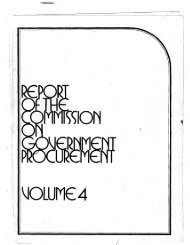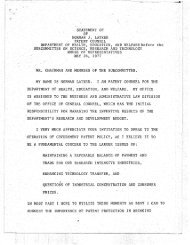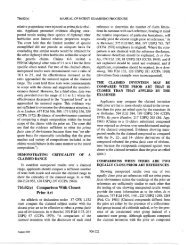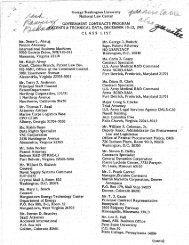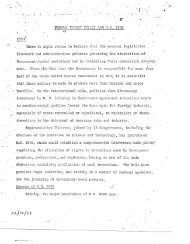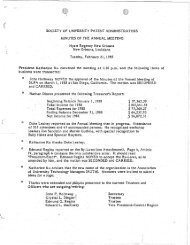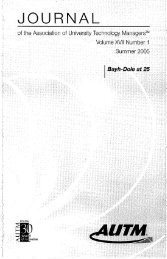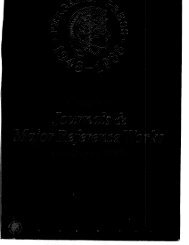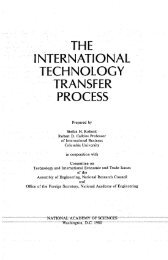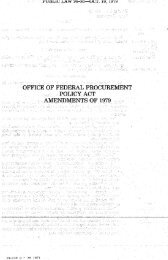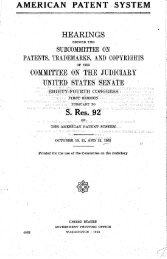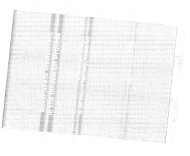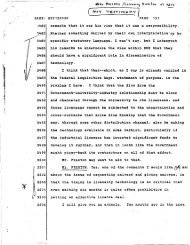patent policies of government departments and ... - Bayhdolecentral
patent policies of government departments and ... - Bayhdolecentral
patent policies of government departments and ... - Bayhdolecentral
Create successful ePaper yourself
Turn your PDF publications into a flip-book with our unique Google optimized e-Paper software.
86th congress}<br />
2d Session<br />
56333<br />
COnDMITTEE PRINT<br />
PATENT POLICIES OF GOVERNMENT<br />
DEPARTMENTS AND AGENCIES-1960<br />
CONFERENCE<br />
ON<br />
FEDERAL PATENT POLICIES<br />
Senator RUSSELL B. LOlllG,. Chairman,<br />
SUBCOMMITTEE ON MONOPOLY<br />
OF· THE<br />
SELECT COMMITTEE ON SMALL BUSINESS<br />
UNITED STATES SENATE<br />
AND<br />
Vice Admiral II. G. RICKOVER<br />
UNITED STATES NAVY<br />
HELD 0",<br />
APlUL. 8, 196.0<br />
Printed for the use <strong>of</strong> the Select Committee on Small Business<br />
UNITED STATES<br />
GOVERNMENT PRINTING OFFICE<br />
WASHINGTON: 1960<br />
'\<br />
/
FOREWORD<br />
For almost 2 years the Subcommittee on Monopoly <strong>of</strong> the Senate<br />
Committee on Small Business has been studying the <strong>patent</strong> <strong>policies</strong><br />
<strong>of</strong> the <strong>departments</strong> <strong>and</strong> agencies <strong>of</strong> the Federal Government <strong>and</strong> the<br />
effect <strong>of</strong> these <strong>policies</strong> on our Nation's scientific <strong>and</strong> economic progress<br />
<strong>and</strong> on the competitive, free enterprise system. Our study culminated<br />
in 3 full days <strong>of</strong> hearings on December 8, 9, <strong>and</strong> 10, 1959.<br />
Our efforts have revealed that the present <strong>patent</strong> <strong>policies</strong> <strong>of</strong> many<br />
<strong>of</strong> our Government <strong>departments</strong> <strong>and</strong> agencies, especially the Department<br />
<strong>of</strong> Defense, have the following effects:<br />
1. The policy <strong>of</strong> giving away to private firms the <strong>patent</strong> rights to<br />
Government-financed inventions <strong>and</strong> discoveries tends to erect walls.<br />
between scientists <strong>and</strong> to prevent a free interchange <strong>of</strong> information.<br />
This tends to retard our scientific advance <strong>and</strong> undermines the very<br />
security <strong>of</strong> our country. The reason rests on the fundamental fact.<br />
that the diffusion <strong>of</strong> scientific knowledge throughout our society is a.<br />
prerequisite for scientific <strong>and</strong> economic progress <strong>and</strong> a rise in general<br />
productivity.<br />
2. With the present distribution <strong>of</strong> research facilities in industries,<br />
the granting <strong>of</strong> exclusive commercial rights to private firms doing<br />
Government-financed research is giving a major advantage to the<br />
larger firms, thus accelerating the pace <strong>of</strong> economic concentration.<br />
One <strong>of</strong> the chief arguments advanced for the policy <strong>of</strong> giving away<br />
<strong>patent</strong> monopolies on publicly financed inventions <strong>and</strong> discoveries is<br />
that if exclusive commercial rights are not given to the contractor,<br />
firms would be reluctant to take contracts, scientists would have no<br />
incentives to invent <strong>and</strong> the cost <strong>of</strong> the contracts to the Government<br />
would increase.<br />
To seek further testimony on the validity <strong>of</strong> these arguments, Adm..<br />
Hyman G. Rickover was invited to describe his contract experiences'<br />
with the Defense <strong>and</strong> Navy Departments, both <strong>of</strong> which allow the<br />
contractors toretain <strong>patent</strong> rights, <strong>and</strong> with the Atomic Energy Commission,<br />
which is required by law to take title to all inventions resultingfrorn<br />
Government-financed research.<br />
It would not be an overstatement to say that Admiral Rickover,.<br />
because <strong>of</strong> his unique <strong>and</strong> wide experience, has quietly <strong>and</strong> effectively<br />
laid these arguments to rest.<br />
RUSSELL B. LONG,<br />
Ohairman, Monopoly Subcommittee,<br />
Select Oommittee on Small Business, [; .S. senate.<br />
JUNE 6, 1960.<br />
HI
8 PATENT'PQIiICIES, cO)l''DEPARTMENTS AND'AGENCIEB<br />
st<strong>and</strong>point <strong>of</strong> whether they are aiding or impeding ournational.progress.<br />
Today, there is no essential difference between military <strong>and</strong> civilian<br />
technology. So anything that holds up one,also hurts-the other.<br />
As I said previously, the <strong>patent</strong> problem that faces us today-was not<br />
'envisioned by the founders, They lived ina preindustrial societya<br />
society where a <strong>patent</strong> resulted from the efforts <strong>of</strong> an individual,<br />
not <strong>of</strong> a large organization. ,<br />
Senator LONG. Do you have any idea or any judgment as to what<br />
you believe the people at the working level, the actual scientists <strong>and</strong><br />
engineers, who are doing the technical <strong>and</strong> developing work, think<br />
about this matter <strong>and</strong> this issue?<br />
Admiral R'CKOVER. The men working on a Government project<br />
surely know it is the Government that is actually paying their salary.<br />
I have never found a lack <strong>of</strong> desire to do good work, just because it<br />
was being done in a Government laboratory instead <strong>of</strong> a private<br />
laboratory, or because the work was being paid for by the Government.<br />
When a company hires a man, they pay him for all his talents, including<br />
his ability to invent.<br />
r\ Mind you, sir, we must stick to the point; we are not now discussing<br />
: our <strong>patent</strong> system ; we are only discussing whether the Government<br />
should retain rights to <strong>patent</strong>s for which it pays. To the individual<br />
scientist-or engineer who makes the invention or contributes to it"<br />
" there is no financial difference anyway. The company gets the <strong>patent</strong><br />
rights; not he. If he is a good man, if he makes an invention Or<br />
otherwise makes himself <strong>of</strong> greater value,he will be promoted <strong>and</strong> his<br />
pay increased whether the company is paying his salary directly,<br />
or the Government indirectly.<br />
Senator LONG. As I underst<strong>and</strong> your position, from your last<br />
statement, if the Government hired a contractor to develop something<br />
for the Government, the contractor, scientists, <strong>and</strong> ·engineers are<br />
actually working for the Government, notwithst<strong>and</strong>ing the fact that<br />
the contractor is interposed between them <strong>and</strong> their Government.<br />
Admiral RICKOVER. Yes,sir. As far as they are concerned, they<br />
do the same in either case, <strong>and</strong> get the Same treatment.<br />
Senator LONG. In other words, if I were-a scientist working either<br />
for the AECor a contractor <strong>of</strong> the AEC, I would be smart enough to<br />
know that Tam actually working to develop atomic energy for the<br />
U.S..Government.<br />
Admiral RICKOVER. Yes, sir. There is an analogy between this<br />
situation <strong>and</strong> .the one that obtains in education-one <strong>of</strong> my favorite<br />
subjects, as you know. The National Education Association, a<br />
self-admitted lobbying organization, assumes to speak, for the teachers.<br />
The NEA is constantly saying what they suppose the teachers to be<br />
thinking. The teachers rarely speak for themselves. However, I<br />
receive many letters from teachers who say: "Please' don't quote'<br />
me; I thoroughly disagree with ths NEA, but I am afraid to talk."<br />
In the case <strong>of</strong> <strong>patent</strong>s, everybody is talking for the scientists <strong>and</strong><br />
engineers except they themselves. The <strong>patent</strong> lawyers are always<br />
telling us what the scientists <strong>and</strong> engineers think. Now, I happen<br />
to deal directly with many scientists <strong>and</strong> engineers; I have not heard<br />
them express the thoughts on <strong>patent</strong>s as espoused by the <strong>patent</strong><br />
lawyers. ,:" '<br />
Senator LONG. Would you careto elaborate further Onwhat you do<br />
detect the attitude <strong>of</strong>scientists <strong>and</strong> engineers to be?
Senator LONG. Do you have knowledge <strong>of</strong> any companies who takethe<br />
attitude that they are not interested in doing work for the Govem-.<br />
ment unless they can keep private <strong>patent</strong> rights?<br />
Admiral RrCKOVER. I personally have never heard <strong>of</strong> any, sir.<br />
There may be some, but I have never encountered one. If a company<br />
attempted to do business with me that way I'd go elsewhere without.<br />
a moment's delay. If we have to depend on anyone company in the<br />
United States to do Government work we are in a pretty bad way.<br />
We had better see to it without delay there is another. This issue we<br />
are discussing also touches on the problem <strong>of</strong> national interest versus.<br />
group interest. I believe too much <strong>of</strong> group interest obtains in the<br />
United States. At this critical time in our national life we should not<br />
permit any group interest to predominate over the national interest.<br />
Because if Om' country is not strong, neither will any <strong>of</strong> the groups in<br />
our country be strong. They all derive their strength from Om' Nation.<br />
Senator LONG. Thank you very much, Admiral Rickover. You.<br />
are always frank, <strong>and</strong> you give us your best advice.<br />
o
Now,you underst<strong>and</strong>, on that definition there could be two individuals<br />
working on the same project by title. One would do it from<br />
the basic research approach <strong>of</strong> trying to discover anything that may<br />
turn up, <strong>and</strong> the other has an eye to something useful that. may turn....<br />
up. So their results might be quite different.<br />
• . But, you underst<strong>and</strong>, the title could be.the same. Sometimes people<br />
object to this defintion, saying that it would require a psychiatrist to<br />
find out what man's motives are. My answer to that is, if one can't<br />
underst<strong>and</strong> without a psychiatrist what his motives are, it probably<br />
is basic research. '. .<br />
Senator O'MAHONEY. Mr. Gibbons.!<br />
Mr. GIBBONS. No question.<br />
Senator O'MAHONEy.Mr. Wright!. •<br />
Mr. WRIGHT. I think Mr. Clesner would like to ask questions about<br />
the specific.contract.. . ..<br />
Senator O'MAHONEY. Very well, Mr. Clesner,<br />
Mr. CLESNEB.. I would like to refer to your instrumentation grants<br />
for laboratory equipment, <strong>and</strong> your grant for the oceanography vessel,<br />
<strong>of</strong> which a good'amount, <strong>of</strong> the equipment there will bein Instrumentation.<br />
Inthe latterinstance, thereis no reservationor right or license<br />
that the instruments developedthere would be availableto all. '<br />
However, .the· knowledge <strong>of</strong> what the instrument is made up <strong>of</strong>,<br />
how it is constructed, would be available.<br />
The designs, plans, <strong>and</strong> drawings; but as to the instrumentsthemselves,<br />
there is no license provisiontoassure that they would be available<br />
to all. ;' ',. '.<br />
Mr. WA;ERMAN. Of course, we consider this oceanographicvessel<br />
asa tool to accomplish basic research, <strong>and</strong> ,we expect that the. vessel<br />
will be outfitted with the most recent instruments in existence to<br />
fulfill themission <strong>of</strong> the vessel <strong>and</strong> therefore be <strong>of</strong>use to the scientists,<br />
So, generally speaking, as to what one does in the yessel-you<br />
don't start from scratch <strong>and</strong> try to devise new instruments, but you<br />
try to take regulation instruments<strong>and</strong>.installthemon"the vessel-for<br />
the best possible use.' .''" .<br />
The purpose is not really todevelopnew instruments.. Itis to outfit<br />
the vessel with the best instruments we have, <strong>and</strong> then go on.<br />
. Now, admittedly,' when you get a scientist at work with such an<br />
instrument, he may make modifications to help him do his workbetter,<br />
Butthatwould hardly be a new instrument.<br />
This is like buying a car-when you want to design the car to fulfill<br />
a particular purpose <strong>and</strong> you just want to outfit it with the things<br />
that are available to make it do the job.' ...'" .<br />
Mr. CLESNER.Thismay be true, butitstill maybe <strong>patent</strong>able sub-ject<br />
matter.<br />
.' Mr. WATERMAN, Thatis possible, I suppose. We would not expect<br />
if we want to get the vessel fast that we would have time to. do that.<br />
Mr. CLESNER.. Now with regard to the contracts which we have<br />
here;you have stated.factorssuch as public health <strong>and</strong> safety,if they<br />
are involved, should bea major consideration.. You have granted<br />
several contracts for weather modification, for example.<br />
: N()w years ago, back about 1900, the. Department <strong>of</strong> Agriculture,<br />
-through its Weather Bureau, when·theWeatherBureau wasInthe<br />
Department, gave Mr. Fessenden a contract. The Bureau allowed
58 GOVERNMENT PATENT·PMCTICES<br />
similar provision would be put into it. So we think that this would<br />
adequately safeguard the public interest.<br />
This is'hardly. a commercial item, but,still, there might be something<br />
coming along; I mean it wouldn't be <strong>of</strong> widespread use, but<br />
something might come along. '<br />
If so, we would protectit by this device <strong>of</strong> getting Research Corp.<br />
to file the <strong>patent</strong>, be assigned the <strong>patent</strong>, <strong>and</strong> then any royalties that<br />
come out would be used back again for education <strong>and</strong> nonpr<strong>of</strong>it use.<br />
Mr. CLESNER. But the discretion would then be vested in Research<br />
Corp. <strong>and</strong> not in National Science Foundation.<br />
Mr. WATEfu'£AN. But they would guarantee to use it for the best<br />
interest <strong>of</strong> national science. They don't, <strong>of</strong> course, take it all, but they<br />
have to pay their costs out <strong>of</strong> it. Again, the Government has the use<br />
<strong>of</strong> it as before.<br />
Mr.CLEsNER. We also note that in the list thatyou submitted to<br />
us <strong>of</strong> <strong>patent</strong> applications pending, some <strong>of</strong> them dealt with subjects<br />
whichhavepossible commercial application.<br />
We don't know what would be the effect <strong>of</strong> the pittents<strong>of</strong> these<br />
high pressure presses that you list. However, it is possible that that<br />
would have significant commercial use,too., '<br />
Mr. WATERMAN. This is another one which ,has been assigned to<br />
Research Corp. We, <strong>of</strong> course, had our eye On this one, too, for the<br />
reason you have stated, There's one application 'in, I underst<strong>and</strong>.<br />
Mr. STEDMAN. Along the lines <strong>of</strong> the recent discussion, you had<br />
indicated in your testimony that you had roughly 13,000 grant contracts<br />
<strong>and</strong> about 13,000 fellowship contracts, <strong>and</strong> I believe you said<br />
in talking about this area that you had been informed to date <strong>of</strong><br />
aboutthree <strong>patent</strong>s that had been issued, <strong>and</strong> roughly 13 applications.<br />
Mr,WATERMAN. Yes. .<br />
Mr. STEDMAN. Are you satisfied that this is all <strong>of</strong> the <strong>patent</strong>able or<br />
<strong>patent</strong>ed research that has come out <strong>of</strong> these 26,000 contracts1<br />
··Mr"WATERMAN. We can't be sure, <strong>of</strong> course, but we would think<br />
this' is probably right. .<br />
Mr. STEDMAN. Do you have any procedure for following up in the<br />
case <strong>of</strong> thesecontractsl, T a lll thinking <strong>of</strong> this in connection with<br />
your publicwelfare yriteria that youtalked about before. .'<br />
. Do-you have' a procedure for following up onitto find out, in.fact,<br />
exactly what is happening under these contracts1<br />
.Mr. WATERMAN.' We require fiscalreportsevery 6 months from all<br />
these grants'<strong>and</strong>contracts, <strong>and</strong> annual.reports about what was done.<br />
Also, we have had the requirement, you see, that they do inform<br />
us where <strong>patent</strong> has beenissued. We' have not examined each one in<br />
detail for this, but considering thenature <strong>of</strong> the problem, it seems<br />
reasonable that about that number might be expected, <strong>and</strong> that is<br />
about all.<br />
,,' Mr. STEDMAN. This is during the period <strong>of</strong> the contract or does it<br />
extend to the continuation <strong>of</strong> their work after the contract has been<br />
cOlnpletedl<br />
Mr; WATERMAN. No.this extends just for the duration <strong>of</strong>ths con,<br />
tract.<br />
Mr. STEDMAl':f'SO that if they actually perfected something <strong>and</strong><br />
filed an'application, say, 6 months later.'you would only know about<br />
it if they took the occasion, voluntarily, to inform you about it1
Do you believe that 'suchstatutory powers as that make your own<br />
<strong>patent</strong> position better! . . . '. .<br />
Mr. WALTHALL,· You asked me what I believe. My belief Ism the<br />
affirmative. However, T would like to emphasize that I am an engineer,<strong>and</strong><br />
I shouldn't put' mysel£in the position <strong>of</strong> arguing law, I<br />
would rather.Mr, Dunlap would respond to that question.<br />
Mr. DUNLAP. Could you repeat the question,sir! .<br />
Mr. CLESNER. In your case, in TVA's case, the statute gives you<br />
the right to be sued for what you own, <strong>and</strong> it also gives you the right<br />
to sue others for infringement<strong>of</strong> your <strong>patent</strong>.<br />
In the-case-<strong>of</strong> DOD,they: hold that-or rather, the Attorney General<br />
doesn't care to enforce the <strong>patent</strong> rights held by DOD; therefore,<br />
they could not give an exclusive license as you did in the case <strong>of</strong> the<br />
Mica Co; <strong>and</strong> have it enforced. It has been DOD's policy that if they<br />
did own a <strong>patent</strong> that they would give a royalty-free license to anyone,<br />
<strong>and</strong> they could not give an exclusive license. This is also true with<br />
other agencies.<br />
But m your instance, the statute' grants TVA this type <strong>of</strong> au.<br />
thority. And the query is, Do you thmk that-this type <strong>of</strong> authority<br />
as to your title gives you a better, title, for example, in the case <strong>of</strong><br />
that exclusive license!<br />
Mr. DUNLAP. I suppose that is true. This, <strong>of</strong> course, is consistent<br />
with TVA's corporate status in which it can be sued <strong>and</strong> can sue in<br />
respect to. any matter; And TVA also holds property in its-own<br />
:name,that is, personal property, <strong>and</strong> that would. include <strong>patent</strong> rights.<br />
Mr. VOGEL. I believe I should observe, however, in this connection,<br />
that we have never sued or been sued in this particular matter,<br />
Mr. CLlUSNER. Thatis true. , '<br />
But in your report to the subcommitteeitappeared that this aided<br />
youin settlement <strong>of</strong> claims! .'<br />
Mr. VOGEL. I think there are many advantages in having a COI:porate<br />
status; yes, sir, <strong>and</strong> I am sure this is <strong>of</strong> assistance, as I indicated<br />
earlier.<br />
Mr. CLESNER. ,In other words, it gave you negotiating OI: bargaining<br />
power that you wouldn't have had otherwise, at leastit appeaI:S to<br />
be so from your statement to us in the report,<br />
Mr. VOGEL. That is probably true;<br />
MI:. CLESNER., That IS all, MI:. Chairman.<br />
Senator O'MAHONEY. Mr. Green.<br />
.MI:.GREEN. Noquestions.<br />
Senator O'MAHONEY. MI:. Dinkins.<br />
Mr. DINKINS; MayI ask one question!<br />
.MI:. Vogel, I notice atthe bottom<strong>of</strong> page 4 you makethis statement:<br />
The fact that TVA <strong>patent</strong>s canbe used but'not controlled has not kept Industry<br />
from seeking <strong>and</strong> obtaining licenses. Some 160 different firms' have received<br />
over .zoo nceneee. '<br />
Now, we have had sometestimonyfrom members-<strong>of</strong> industry that<br />
a nonexclusive license would not be attractive to them; because everybody<br />
could make the same thing-.' And my question to you is this: Do<br />
you see any differencein principle.between this method <strong>of</strong> licensing<br />
which you have <strong>of</strong>fered <strong>and</strong> which industry has gladly accepted from<br />
that whichmigh.t exist in other industries making different types <strong>of</strong><br />
products!
or what you have found about the extent to which, if at all, the possession<br />
<strong>of</strong> these <strong>patent</strong> rights may have been reflected in the price<br />
charged to the ordinary nonveteran purchaser.<br />
Dr. STEWART. Well, I believe we can state that the civilians do not<br />
pay essentially more than the Veterans' Administration pays for artificial<br />
limbs.<br />
Mr. WRIGHT. Thank you.<br />
Senator HART. Are there any further questions j<br />
(No response.)<br />
Senator HART. I think that even we laymen can testify to the extraordinarily<br />
fine reputation you <strong>and</strong> the Veterans' Administration<br />
gained in your pursuit <strong>of</strong> more effective means <strong>of</strong> aiding those whowere<br />
unfortunate enough to lose their limbs to adjust, <strong>and</strong> after an<br />
exposure <strong>of</strong> 15 minutes to your publication, I am even more impressed.<br />
Dr. STEWART. Thank you, senato?1<br />
Senator HART. This concludes the cheduled testimony for this<br />
series <strong>of</strong> hearings <strong>of</strong> the committee. nd the committee st<strong>and</strong>s adjourned,<br />
subject to the call <strong>of</strong> the chair.<br />
(Whereupon, at 4 :35 p.m., the subcommittee adjourned, subject<br />
to call <strong>of</strong> the Chair.)
85th congress}<br />
2d Sessiou<br />
EXHIBIT No.1<br />
COMMITTEE PRINT<br />
PATENT PRACTICES OF THE NATIONAL<br />
SCIENCE FOUNDATION<br />
PRELIMINARY REPORT<br />
OF<br />
THESUBCOMMITTEFj ON<br />
PATENTS,'l'RADEMARKS, ANDCOPXRIGH'l'S<br />
pF.. THE<br />
COMMITTE:E()N THE JUDICIARY<br />
UNITED STATES SENATE<br />
,EIQHT¥,FIFTH CONGRESS, SECOND SESSION<br />
PURSUANT TO<br />
S. Res. 236<br />
Printed for the use <strong>of</strong> the Committee on the Judiciary<br />
UNITIDD STA·TES<br />
GOVERNMENT PRINTING OFFICE<br />
WASRINQTON : 1999<br />
123
86th congress}<br />
1st Session .<br />
COMMITTEE PRINT<br />
PATENT PRACTICES OF THE<br />
DEPARTMENT OF HEALTH, EDUCATION,<br />
AND WELFARE<br />
PRELIMINARY REPORT<br />
;·op: THE<br />
SUBCOMMITTEE ON<br />
PATENTS, TRADEMARKS, ANDCOJ:>YRIGHTS<br />
OF THE<br />
COMMITTEE ON THE JUDICIARY<br />
UNITED STATES SENATE<br />
EIGHTX-SIX±H CqNGltESS. FIRST .sEssloN<br />
PURSUANT TO<br />
S, Res; 53<br />
Printed for the use <strong>of</strong> the Committee on the Judiciary<br />
UNITED STATES<br />
GOVERNMENT PRINTING OFFICE<br />
WASHINGTON : 1960<br />
133
168 GOVERNMENrr PArrENrr, ,PRAcrrICES<br />
b. If, upon expiration <strong>of</strong> the time specified, or suchextension<br />
there<strong>of</strong> as approvedbythe Surgeon General, the Surgeon General<br />
finds that the contractor has failed to take appropriate steps adequate<br />
to meet the public need, he shall notify the contractor/with<br />
reasons therefor, that at the end 0£90days fromsuch.notice he<br />
will exercise the rights specified below. If within 20 days <strong>of</strong><br />
receipt <strong>of</strong> such notice the contractor fails to file a written request<br />
for ahe'lJ'ing as provided below, the, Surgeon General sh,all upon<br />
expiration <strong>of</strong> the above 90-day period have the right: ,, ,<br />
(1) todedicate to the public all rights in the invention' or;<br />
, (2) to issue (under oninanticipation <strong>of</strong> the issuance <strong>of</strong><br />
ap.ysuch <strong>patent</strong>) nonexclusive, royalty-free licenses (for<br />
practice <strong>of</strong> the invention for any health purpose) on a nondiscriminatory<br />
basis to all qualified applicants touse,manufacture<br />
<strong>and</strong>sell embodiments <strong>of</strong>the invention for any health<br />
purpose.' ,','<br />
c. If, within 20 days <strong>of</strong> receiptor notice, the, contractor files<br />
such request for [j, hearing, theBurgeon General, or a representative<br />
or representatives, designated by him for this purpose, shall<br />
afford ths contractor a reasonable opportunity to be heard.rto be<br />
represented bycounsel, to present any pertinent information <strong>and</strong><br />
argument, <strong>and</strong> to rebut any other information to be considered<br />
in reaching a decision, The findings by the Surgeon General or<br />
such representative(s). shall be in writing, shall ,be,,base,d solely<br />
on the material presented at the hearing, <strong>and</strong> shall be final <strong>and</strong><br />
binding on the contractor. If the Surgeon General's decision<br />
.based onthesefindingsbe thatthe contractor has not met the public<br />
need <strong>and</strong> that public dedication or additional licensing by the<br />
Surgeon General is necessary in the public.intereste-he may so<br />
dedicate or license,effective at the end <strong>of</strong>, the above-provided 90.<br />
day period or at the conclusion <strong>of</strong> the, hearing, whichever is later,<br />
5. Oontraotor's determination not to, <strong>patent</strong>'-FailJure to -pursue<br />
application., Agreement that in the eventthe.contractor elects, within<br />
a period (not to,exceed six months after the invention was or should<br />
havebeen reported) specified in .the contract, notto file a .<strong>patent</strong> application<br />
on .the invention, or,having elected to file thereafter fails<br />
to file <strong>and</strong> diligently prosecutea12atent application,the Surgeon General,<br />
when he deems.it necessary.in order, to protect the availability <strong>of</strong><br />
the,invention, for .health purposes, shall have the right to require the<br />
assigumentto the Government <strong>of</strong> all domestic rights therein except<br />
for the reservation <strong>of</strong>a nonexclusive royalty-free license to the'contractor;<br />
6. Foreign Rights;; Similarly, agreement that, if the, contractor<br />
fails to file, or elects not to file, foreign <strong>patent</strong> applications which the<br />
SurgeonGeneraldetermines are necessary to protect the availability<br />
<strong>of</strong> the invention for health purposes in other countries, the Surgeon<br />
General may require the assignment' <strong>of</strong> the foreignrights. "<br />
,7;; Renegotiation'onneio.leade. (Such a provision not m<strong>and</strong>atory) .<br />
The contraotmay.provide.that if, in the course <strong>of</strong> the performance <strong>of</strong><br />
the contract, the"contractoridentifies any new lead which it wishes to<br />
develop 'at its own-expense, without utilization <strong>of</strong> facilities financed<br />
:if ssucn dedication to be effeclive against the contractor <strong>and</strong> RJ!Y persons cl,atmlng,from<br />
him upon filing by the Surgeon General with the Commissioner <strong>of</strong> Patents <strong>of</strong> nottce <strong>of</strong>.saroe.<br />
SEither one or both <strong>of</strong> ,these alternatives shall be' epecifl.edl'in' the contract.
phate, slag expansion, phosphate reducing furnace, <strong>and</strong> a rotating<br />
furnace.<br />
All <strong>of</strong> these licenses require the licensee to report annually on the<br />
number <strong>of</strong> months the invention was in actual use. By these reports<br />
the TVA is kept informed as to the use made <strong>of</strong> all <strong>of</strong> its inventions,<br />
even when used only by licensees.<br />
III. AGENCY VIEWPOINT<br />
A. JUDGMENT AS TO EFFECTIVENESS OF PRESENT POLICY<br />
The TVA has statedthe<br />
positive usefulness <strong>of</strong> TVA ownership <strong>of</strong> <strong>patent</strong>s on<br />
inventions developed by it is exemplified by the great number<br />
<strong>of</strong> licenses which have been issued to fertilizer producers <strong>and</strong><br />
manufacturers <strong>of</strong> fertilizer products <strong>and</strong> equipment under<br />
the <strong>patent</strong>s described above. Through the nonexclusive,<br />
royalty-free licenses TVA grants under such <strong>patent</strong>s, TVA<br />
preserves to the public the benefit <strong>of</strong> its efforts, in accordance<br />
with the provisions <strong>of</strong> the TVA Act, to improve the quality<br />
<strong>of</strong> fertilizers <strong>and</strong> to improve mid cheapen the methods <strong>of</strong><br />
production. Obviously, a manufacturer <strong>of</strong> fertilizer or<br />
equipment is much more willing to try a new process or<br />
piece <strong>of</strong> apparatus developed by TVA if he has the protection<br />
<strong>of</strong> TVA's <strong>patent</strong> ownership. TVA's system <strong>of</strong> licensing<br />
has also helped it to keep reasonably accurate data on the<br />
extent <strong>of</strong> use <strong>of</strong> its developments.. It is estimated on the<br />
basis <strong>of</strong> such data that TVA methods are used in the production<br />
<strong>of</strong> about two-thirds <strong>of</strong> the 3 to 4 million tons <strong>of</strong><br />
granular fertilizers manufactured annually in the United<br />
States (letter <strong>of</strong> Sept. 23, 1957, from Chairman <strong>of</strong> the<br />
TVA Board, Herbert D. Vogel, to Senator Joseph C.<br />
O'Mahoney),<br />
None were <strong>of</strong>fered.<br />
B. RECOMMENDATION AS TO FUTURE POLICY<br />
(9)
238 GOVERNMENTPATENTiPRACTIOi'S<br />
manufacture <strong>of</strong> the invention for <strong>government</strong>al purposes: The VA,<br />
in addition, usually acquire the right to reproduce <strong>and</strong> disclose technical<br />
informationjdesigns, drawings,reports, <strong>and</strong> data pertaining to<br />
theinventio.rl. ,<br />
The Veterans' AdiniIlistrationorig;llallydrafted a "shortform'" <strong>and</strong><br />
later a "long form'" <strong>patent</strong> clause to be used in its research contracts.<br />
Under the "short form" clause the Government retains, all foreign<br />
<strong>and</strong> domestic rights to inventions <strong>and</strong> the VA's contracting <strong>of</strong>ficer<br />
determines whether <strong>patent</strong>s should be applied for. The VA at present<br />
has 10 contracts still in effect containing the "short form" or the<br />
"modified short form" clauses. Six contracts containing the "short<br />
form," "modified short form A'" <strong>and</strong> the "Modified short form<br />
B" 10 clauses have terminated. The "modified short form A" <strong>and</strong><br />
"modified short.form B" clauses are essentially identical to the "short<br />
form" clause except that both <strong>of</strong> these "modified" forms state that the<br />
'contractor is relieved from any obligation <strong>of</strong> prior art searches, the<br />
preparation, filing, <strong>and</strong> prosecution <strong>of</strong> <strong>patent</strong> applications, determination<br />
<strong>of</strong> questions <strong>of</strong> novelty, <strong>patent</strong>ability, <strong>and</strong> inventorship,<br />
The "modified short form A" also states that the contractors are not<br />
responsible to the Government for any defaultcaused by all employee<br />
directly engaged in the contract workwho.breaches an agreement with<br />
the fontractor to execute all documents <strong>and</strong> other required duties<br />
necessary to fulfill the contract. The ','modified short form" <strong>patent</strong><br />
contract clause states that whenever any <strong>patent</strong>able invention is made<br />
by the contractor or its employees in the course <strong>of</strong> the contract, the<br />
VA contracting <strong>of</strong>ficer has the sole power to determine whether or not<br />
a <strong>patent</strong> application shall be filed, <strong>and</strong> to determine the disposition <strong>of</strong><br />
,the title to <strong>and</strong> the rights under any application or <strong>patent</strong> that may<br />
result, Although contracts. containing the "short form" <strong>and</strong> the<br />
various "modified short forms" pateritelauses have been in use since<br />
World War II, the Veterans' Administration has yet to file any <strong>patent</strong><br />
applications for inventions resulting from these researchcontracts.<br />
The "short form" <strong>patent</strong> clause in contracts for the development <strong>of</strong><br />
prosthetic devices was originally prepared by the Judge Advocate<br />
General's Office <strong>of</strong>.the.Department <strong>of</strong> the Army at the request <strong>of</strong> the<br />
then Secretary, Robert Patterson, in order to aid civilian employees<br />
injured in war plants as well as injured servicemen. For tills purpose<br />
it was deemed necessary that the Government retain title to the invention<br />
<strong>and</strong> whatever other rights that would be the result <strong>of</strong> the<br />
contract. However, the VA has never insisted that the "short form"<br />
be insertedin.,itscontracts.'·':'



